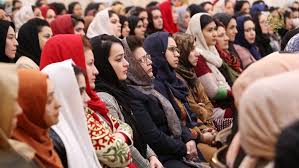Taliban restrictions on Afghan women
The Taliban government in Afghanistan has a history of imposing heavy restrictions on women, which have been extremely restrictive and oppressive. Some of these restrictions are:
-
Prohibition of education for women and girls: The Taliban banned education for women and girls during their rule. Women were not allowed to attend schools and universities, and this issue led to the termination of many women and girls’ hopes of achieving education despite their capabilities.
-
Restrictions on social and occupational activities: The Taliban imposed many restrictions on women in social and occupational activities. Many women were forced to avoid participating in professional and even social activities.
-
Prohibition of leaving the house without the accompaniment of close men: Women were forced to be accompanied by a close man to leave the house, even for everyday tasks such as shopping at the store or going to the doctor.
-
Compulsory covering for women: The Taliban required women to wear legitimate Islamic clothing to cover their bodies, and failure to comply with these rules was accompanied by punitive punishment.
-
Prohibition of employment: Women were restricted from many job fields and were not allowed to work in many economic and professional fields.
These restrictions have affected Afghan women and severely limited their lives. These measures not only limited women’s access to basic rights and opportunities, but also led to the disgust of the international community.

The situation of Afghan women in the Taliban regime
The status of women in the Taliban government has been widely influenced by the laws and policies of this group, which have generally limited the rights and freedoms of women and created many restrictions for them. Some characteristics of the status of women during the Taliban regime are:
-
Prohibition of education: The Taliban banned women and girls from studying in schools and universities. This ban caused many women and girls to be denied access to basic education and their right to education was violated.
-
Limitations to be in public spaces: Under the Taliban regime, women were only allowed to leave the house accompanied by close men. The presence of women in public spaces was limited and under surveillance control.
-
Restrictions on employment rights: Many Afghan women experienced many restrictions on their employment rights due to the policies of the Taliban and were generally denied from participating in the labor market.
-
Restrictions in clothing: Women must be dressed strictly and follow the Islamic rules of dress. Non-observance of these rules was possible to different types of known violence
Why are the Taliban against women?
There are various reasons that can cause the Taliban government to oppose women and impose restrictions on women. Understanding this issue requires examining various cultural, political, and social factors that are influenced by the laws and beliefs of the Taliban. Some of the important reasons are:
-
Different interpretation of Islam: The Taliban follow a conservative and traditional interpretation of Islam, according to which women should live according to Islamic law. The Taliban believe that women should be engaged in raising children as housewives and mothers of the family and should stay out of public and social activities.
-
Cultural and Traditional Attitudes: In the Afghan culture, there are various cultural interpretations and attitudes that may conflict with the Taliban’s point of view. Some members of the Taliban come from regions with specific cultural backgrounds and interpretations of Islam that place restrictions on women.
-
Social control: The Taliban seek to maintain order and social control and believe that restrictions on women can help to establish this order. The Taliban believe that women should be confined to their homes

Unemployment of women in the Taliban regime
Under the Taliban regime, women’s unemployment has occurred for various reasons, including legal, cultural, and social restrictions. During this period, women faced many restrictions that limited their abilities and basic rights. Some of the reasons for women’s unemployment in the Taliban regime are:
-
Legal restrictions: The Taliban imposed many legal restrictions on women, which prevented women from participating in the labor market. Prohibition of education for women and defining specific gender roles for them were among these restrictions.
-
Cultural and social limitations: Culture and society in the Taliban regime did not allow women to enter the labor market and work in different fields. These restrictions were due to conservative interpretations of Islam and different cultural attitudes.
-
Threat to security: For many women, job security was a serious issue, and security threats in work environments made women stop participating in economic and social activities.
-
Lack of access to resources: Women in the Taliban regime were prevented from participating in the labor market due to restrictions on access to financial resources and economic opportunities. This included access to property and investment to start a business.
-
Changing social roles: changing social roles and transferring some social duties from women to men also reduced women’s job opportunities.
These factors caused most women to remain unemployed during the Taliban regime and were deprived of employment and economic opportunities. This situation has had negative effects on the economy and society of Afghanistan.